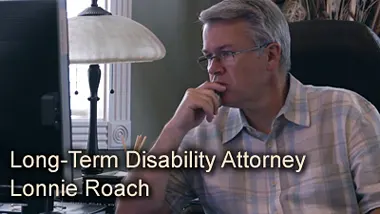Meniere’s Disease and Qualifying for Disability Benefits
Can I get disability benefits if I am suffering from the effects of Meniere’s disease?
Author: Attorney Lonnie Roach
The Social Security Administration recognizes Meniere’s disease as a disabling impairment under Section 2.07 of its Blue Book: Disturbance of labyrinthine-vestibular function. To automatically qualify for disability Income, an applicant must have frequent episodes of vertigo or balance disturbance, gradual, ongoing loss of hearing, tinnitus; and disturbed function of the vestibular labyrinth as shown by vestibular tests.

To automatically qualify for disability income with Meniere’s Disease an applicant must have frequent episodes of vertigo or balance disturbance, gradual, ongoing loss of hearing, tinnitus; and disturbed function of the vestibular labyrinth as shown by vestibular tests. Call 512-454-4000 for a free consultation.
Approximately 615,000 people in the United States are affected by Meniere’s disease, a relatively rare condition.
Meniere’s disease is named after the French doctor Prosper Ménière who first diagnosed the disease in 1861. Most cases occur between the ages of 40 and 60 with 45,500 new cases diagnosed each year.
Meniere’s disease is actually a cluster of symptoms that causes vertigo (a type of dizziness where a person feels like they are spinning), tinnitus (ringing in the ear), hearing loss, and a feeling of pressure or fullness in the ear.
Only one ear is usually affected, but hearing loss can become permanent eventually.
There is no known cause for Meniere’s disease, but doctors now have a better understanding of its symptoms.
Fluid builds up in the inner ear or labyrinth which holds structures that help with hearing and balance. The fluid interferes with signals the brain receives causing dizziness, vertigo and hearing loss.
Researchers theorize that fluid buildup in the ear can be the result of a number of factors:
- poor drainage due to a blockage in the ear;
- a genetic/inherited predisposition;
- an allergic reaction;
- an autoimmune response;
- an injury to the head; or
- Migraine headaches.
Contact a Social Security disability attorney at 512-454-4000 for a free consultation and see if you can get disability benefits while suffering from Meniere’s disease. If you have been denied disability don’t give up!
Meniere’s disease is a progressive disorder, beginning with occasional hearing loss and vertigo developing later.
As time goes on, hearing loss and tinnitus may become constant and a person’s balance and vision may become worse.
Along with hearing, vision, and balance problems, an individual may experience other symptoms:
- anxiety
- blurry vision
- nausea
- trembling
- cold sweat or rapid pulse
Treatment for Meniere’s disease involves medications to reduce fluid in the ear and control motion sickness and nausea.
Physical therapy and vestibular rehabilitation therapy can help a patient develop better balance. In other cases, a doctor may prescribe injections, steroids or surgery.
Symptoms of Meniere’s disease come and go; attacks can last 20 minutes or 24 hours and can occur several times a week or months or even years apart.
The unpredictable nature of Meniere’s disease can suddenly interrupt a person’s life and put them at risk of falling and other accidents. Maintaining full-time employment may become impossible.
The Social Security Administration recognizes Meniere’s disease as a disabling impairment under Section 2.07 of its Blue Book:
2.07 Disturbance of labyrinthine-vestibular function (Including Ménière’s disease), characterized by a history of frequent attacks of balance disturbance, tinnitus, and progressive loss of hearing. With both A and B:
- Disturbed function of vestibular labyrinth demonstrated by caloric or other vestibular tests; and
- Hearing loss established by audiometry.
To automatically qualify for Social Security Disability Income, an applicant must meet the requirements of the listing:
- frequent episodes of vertigo or balance disturbance;
- gradual, ongoing loss of hearing;
- tinnitus; and
- disturbed function of the vestibular labyrinth as shown by caloric or other vestibular tests.
Additionally, an applicant must not make $1,020 per month and must show that their medical condition has lasted, or is expected to last 12 months.
Social Security will expect your medical records to confirm a diagnosis of Meniere’s disease and show that your medical condition is so severe that even with treatment you are unable to work.
Your doctor should distinguish episodes of rotary vertigo from light-headedness, unsteadiness, dizziness or confusion in their statement and reports.
Your medical records should cover a series of examinations over a prolonged period of time, including:
- A neuro-otolaryngologic examination report, detailing frequency, duration and severity of vertigo attacks.
- Results of tests evaluating vestibular function.
- Results of pure tone and speech audiometry.
- Other test results, such as x-rays, CAT scans and MRIs.
The following are some examples of tests you should provide to Social Security as medical evidence of your disability.
- Audiometric exam – tests hearing loss in the affected ear.
- Electronystagmogram – evaluates balance.
- Electrocochleography – measures fluid pressure in the inner ear.
- Rotary chair testing – determines how eye movement affects the inner ear.
- Posturography – tests balance and how well balance is maintained.

If your disability meets the criteria of the Social Security’s listing, you will be automatically approved for SSDI, but if it doesn’t it is still possible you may qualify for disability benefits.
Social Security will do a residual function capacity assessment (or RFC) to evaluate your ability to perform work-related tasks. Social Security will review your medical records and may ask that you see a doctor or audiologist hired by the Social Security Administration. A doctor may find that you are not able to work at jobs that involve heights, or your medications cause sleepiness and fatigue. If you can prove that there has been a 20% reduction in your productivity, it’s likely the Social Security Administration will find you disabled.
Additionally, if you have another impairment; for example, high blood pressure or diabetes, you may be eligible for SSDI.
Applicants often have more than one illness or injury that prevents them from working full time. By itself one disorder may not meet the requirements of an impairment as stated in Social Security’s Blue Book. However, if an applicant has multiple medical conditions, Social Security must consider how those health issues, combined together, limit an applicant’s ability to hold a job and perform necessary daily tasks. Social Security will also evaluate how your limitations affect your ability to work (called a medical vocational assessment), taking into account whether or not you are able to drive, your age, and level of education.
If you have Meniere’s disease and your condition has prevented you from working, you may be eligible for Social Security Disability Income.
Applying for SSDI can be a long and confusing process. An experienced Social Security Disability lawyer can review your case and help you navigate Social Security’s procedures, improving your chance for a successful claim.
In order to qualify for Social Security Disability, you will need to satisfy a few specific requirements in two categories as determined by the Social Security Administration.
The first category is the Work Requirements which has two tests.
- The Duration of Work test. Whether you have worked long enough to be covered under SSDI.
- The Current Work Test. Whether you worked recently enough for the work to actually count toward coverage.
The second category is the Medical Eligibility Requirement.
- Are you working? Your disability must be “total”.
- Is your medical condition severe? Your disability must be “severe” enough to interfere with your ability to perform basic work-related activities, such as walking, sitting, and remembering.
- Is your medical condition on the List of Impairments? The SSA has a “List of Impairments” that automatically qualify as “severe” disabilities. If your disease is not listed this does not mean you cannot get disability, it means you must prove you cannot maintain employment due to your limitations.
- Can you do the work you did before? SSDI rules look at whether your medical condition prevents you from doing the work you did prior to developing the condition.
- Can you do any other type of work? If you cannot do your prior work, an evaluation is made as to whether you can perform any other kind of work.
More details can be found on our Qualifying for Disability page.
Disability benefits are an important source of income for those who are unable to work. If you are not able to work due to accident or illness, you may be eligible for Social Security Disability or Long Term Disability benefits. If you have applied for benefits and been denied, contact the attorneys at Bemis, Roach and Reed for a free consultation. Call 512-454-4000 and get help NOW.
Try these links for further reading on this subject:
Parkinson’s Disease
Texas Disability Lawyers and Multiple Sclerosis
Life After a Stroke: Why You Need a Strong Legal Advocate in Your Corner

Your Free Initial Consultation
Call now:
At Bemis, Roach and Reed, if we can't help you, we will try to find the right attorneys for you.
We offer each of our prospective clients a free no obligation one hour phone or office consultation to see if we can help you and if you are comfortable with us. We know how difficult a time like this can be and how hard the decisions are. If we can be of assistance to you and help you find a solution to your issue we will even if that means referring you to another attorney.
Let's get you Started:
If you could provide us with some basic information about your claim we will get right back with you with a free case evaluation and schedule your Free Consultation Today.






